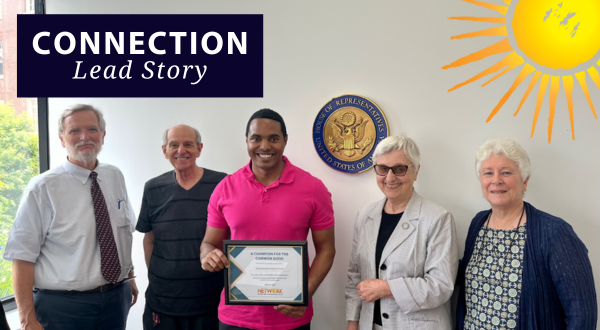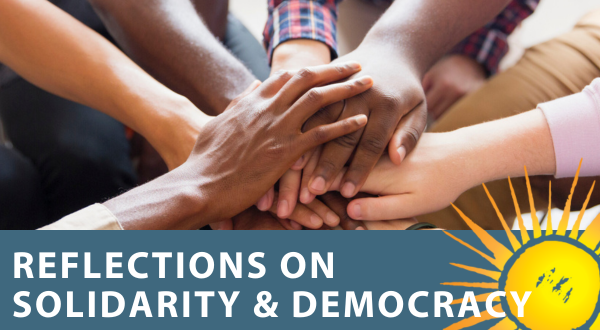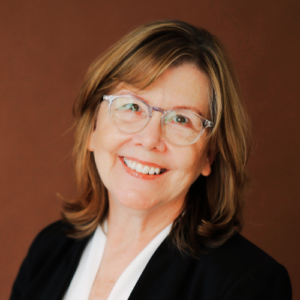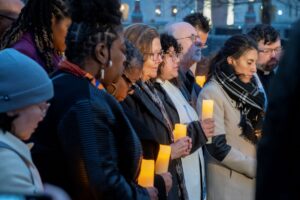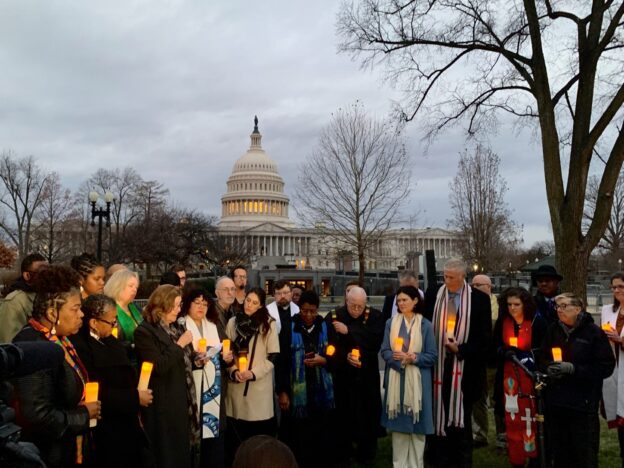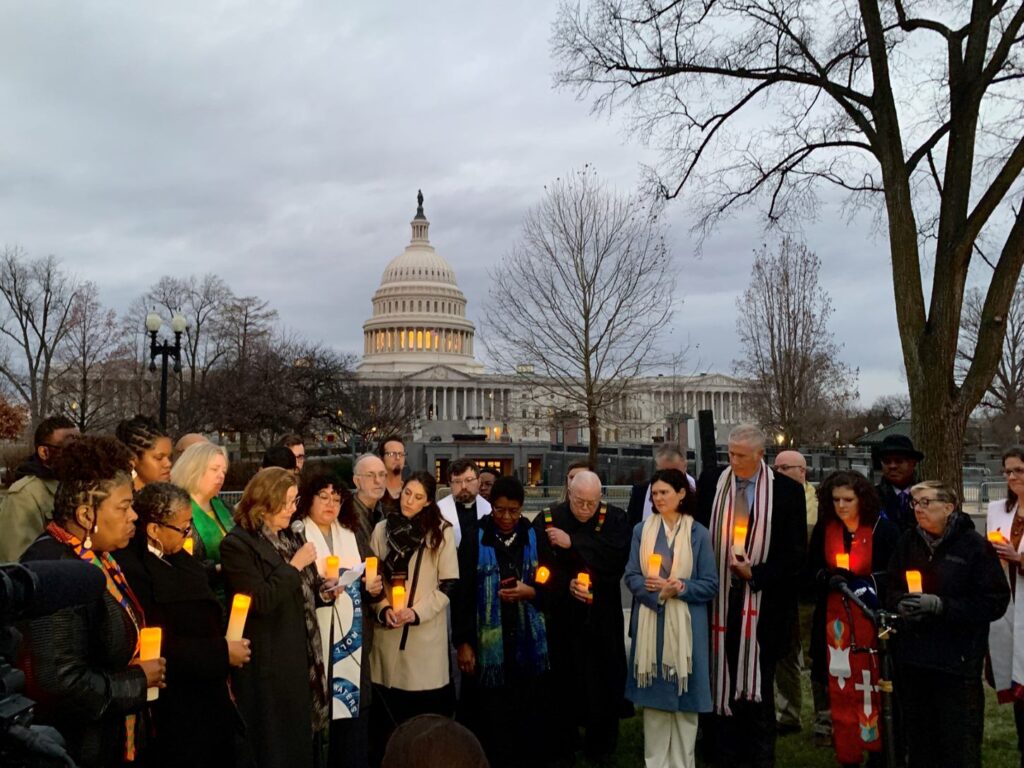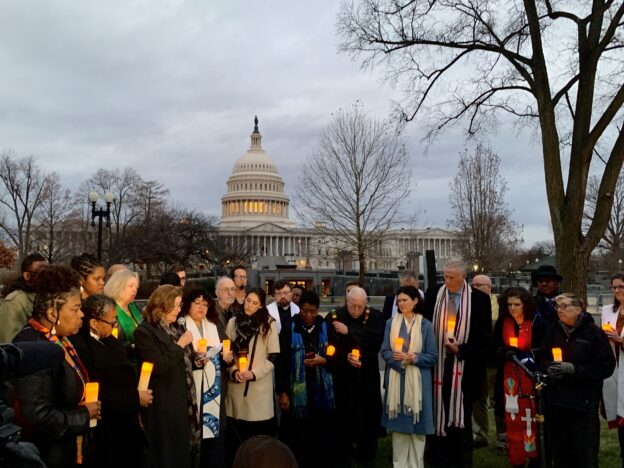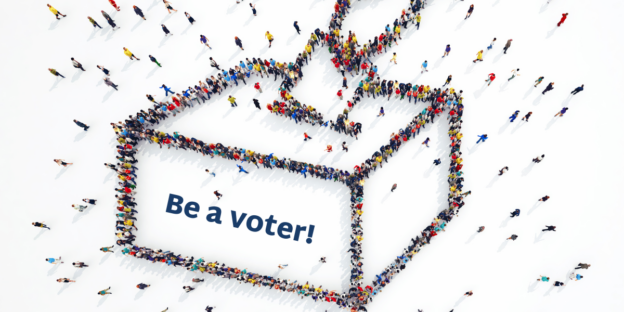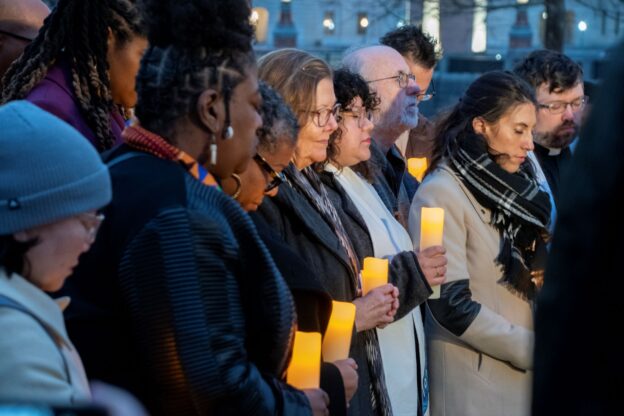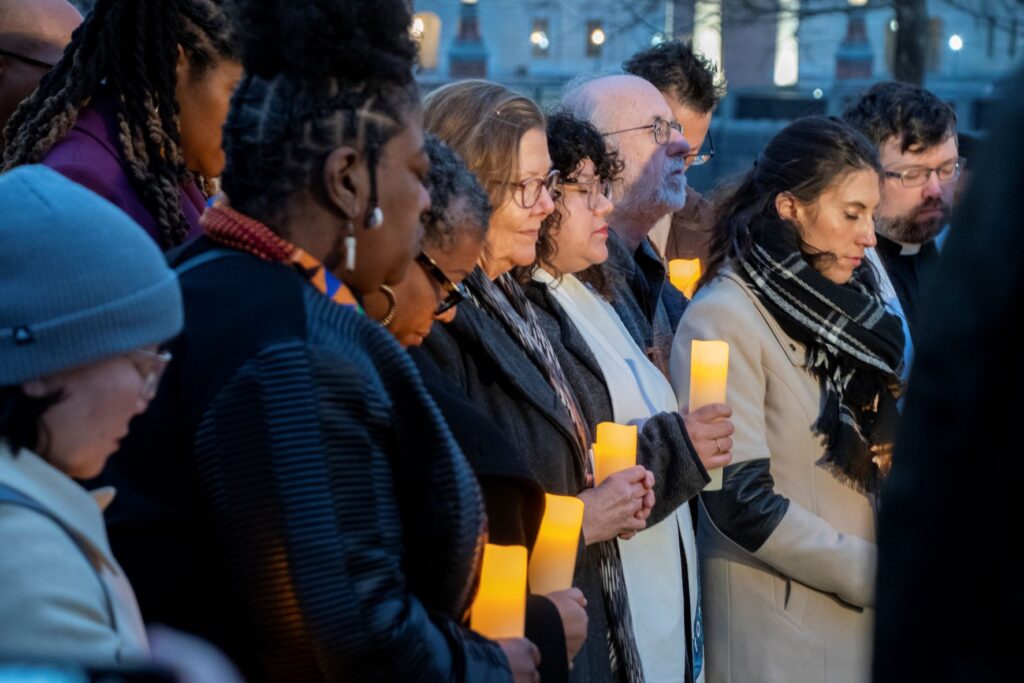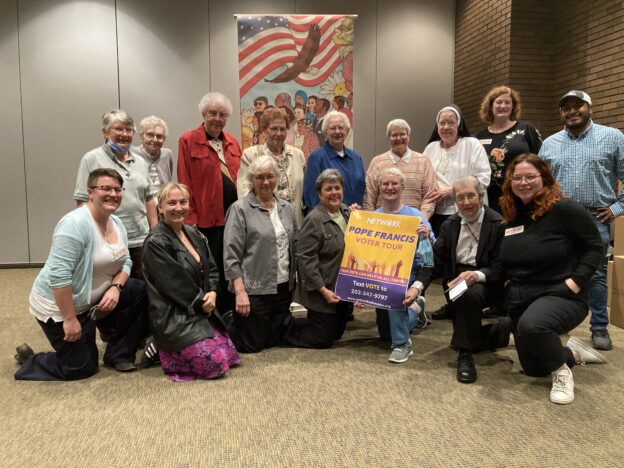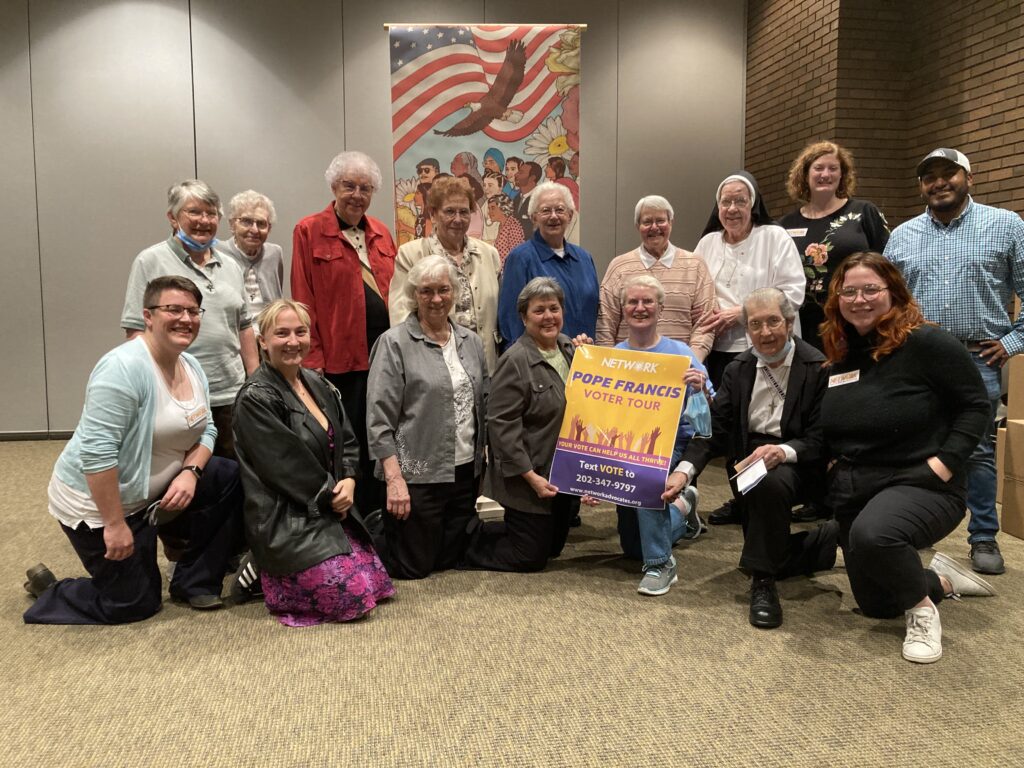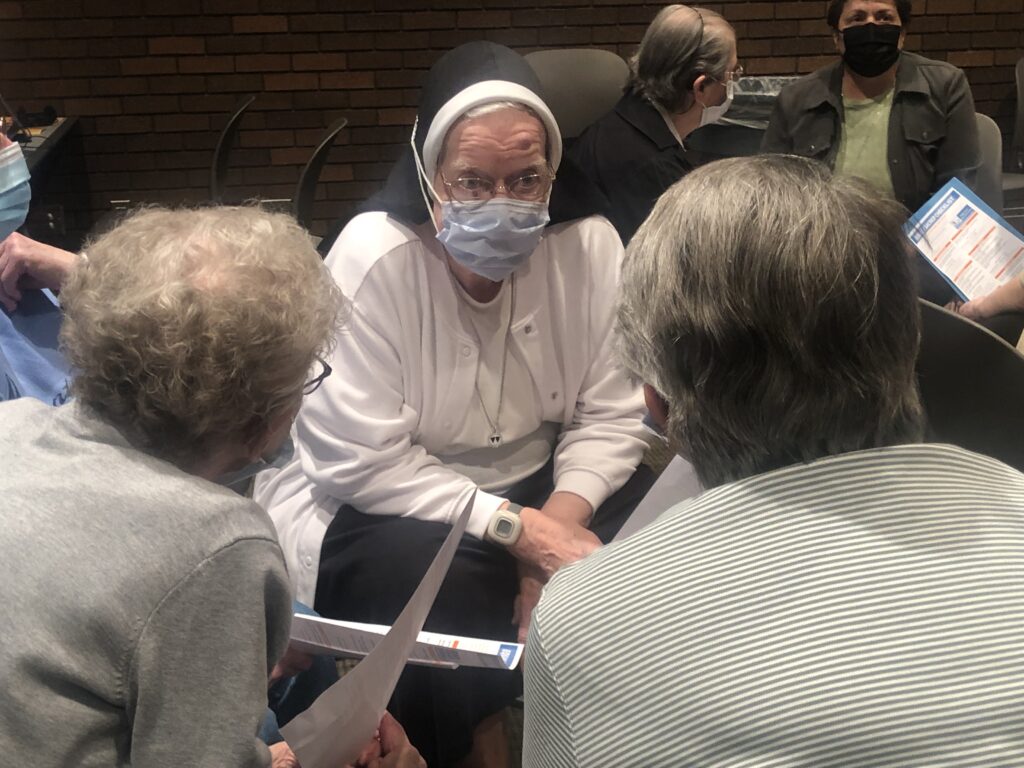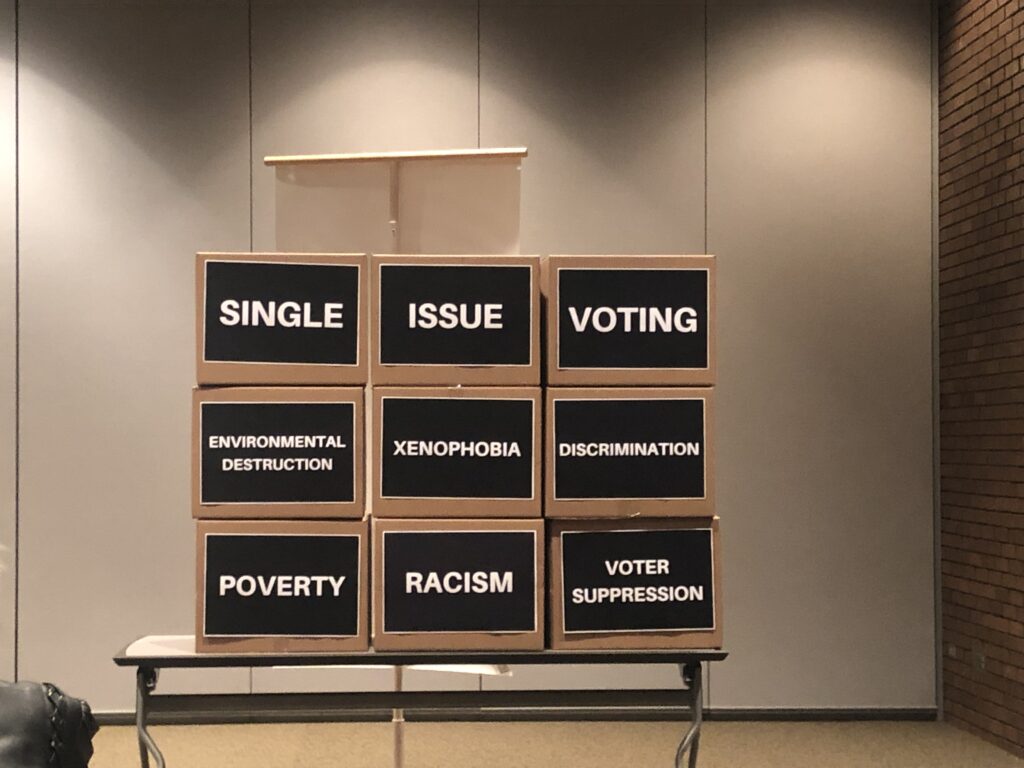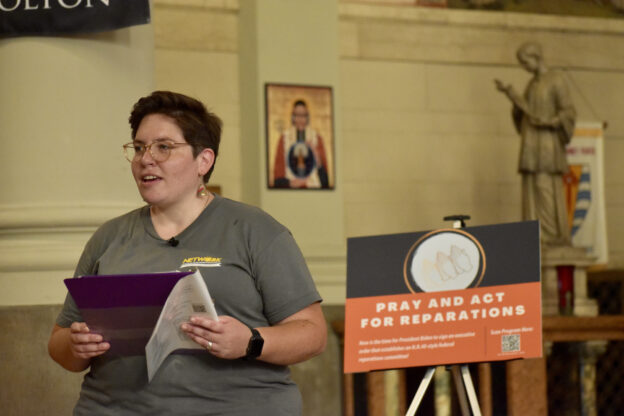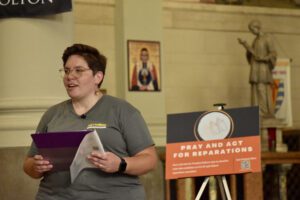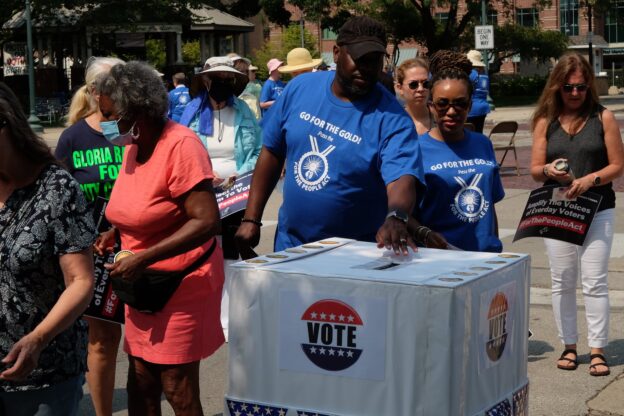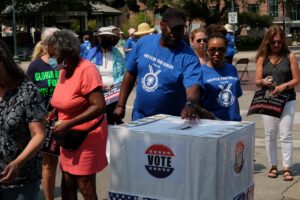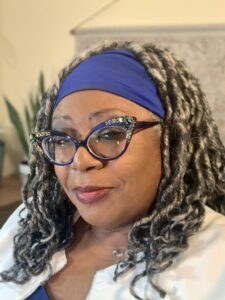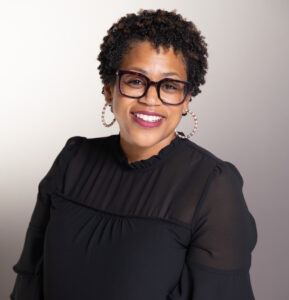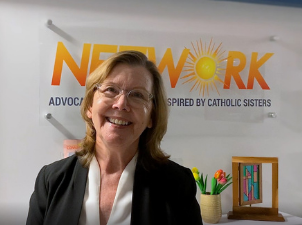
Working for Transformation
New York Advocates Show the Power of Commitment to Issues, People, and Communities
Mark Pattison
November 10, 2023
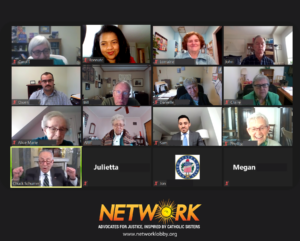
Justice-seekers from New York and NETWORK staff participate in a Zoom meeting with Senate Majority Leader Chuck Schumer of New York in 2021.
Getting involved in the work of justice-seeking takes many forms. For Anne Kiefer of Penn Yan, N.Y., it was as simple as receiving an email. “There was an invitation: If you would like to become more active, come to a New York NETWORK Advocates Team meeting,” she recalls. “If you have an inclination to do advocacy for social justice issues,” Kiefer says, “NETWORK makes it easy. I can’t say enough for the support you get.”
She’s had letters to the editor published in her local Finger Lakes Times newspaper and in the Rochester Democrat and Chronicle on preserving the expanded Child Tax Credit. With issues-based advocacy, Keifer notes, “it’s really great to turn aside from the partisan part of it, which has gotten toxic in the last few years.”
NETWORK, with its long and vibrant history of over 50 years of educating, organizing, and lobbying on federal policy affecting the common good, has in recent years built Advocates Teams in strategic states across the U.S. With Catholics coming together with people of other faith traditions as well as secular justice-seekers, these teams exemplify the power of organizing and advocating for the common good. And the New York NETWORK Advocates Team, after just a couple of years, has shown what members dedicated to the issues of NETWORK’s policy agenda can do to serve people impacted by these issues, to each other, and to their communities.
Building Relationships
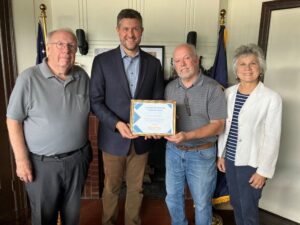
Janet and Lou Tullo, along with Bill Hurley, present a 2022 NETWORK Voting Record certificate to Rep. Pat Ryan (N.Y.-18). The Congressman received a 100 percent rating from NETWORK for his votes in the second session of the 117th Congress.
Catherine Gillette, NETWORK’s senior grassroots mobilization organizer, convened the New York team in mid-2021. With her from the start was Jane Sutter Brandt, a communications professional who now serves as team lead. The group meets monthly on Zoom, with Gillette providing policy updates and opportunities for advocacy as the team’s liaison to NETWORK. “Jane’s leadership has been invaluable,” notes Gillette.
Sutter Brandt says of Gillette, “She sends out the links to the NETWORK policy position on its website,” plus messaging to New York’s congressional representatives. “They make it so easy for us to be advocates, and to encourage family and friends to be advocates.”
“I know it’s in line with where I want to go as a Catholic.” —William Hurley
NETWORK first came to Rev. Peter Cook’s attention through a Nuns on the Bus tour. Cook, executive director of the New York State Council of Churches and its 7,500 congregations, and himself an ordained United Church of Christ minister, said the council collaborated with Nuns on the Bus on tax policy and a threatened rollback on the Affordable Care Act. Earlier this year, he collaborated with NETWORK on the “Care Not Cuts” rally NETWORK held in Long Island.
“With NETWORK, we thought they’d have the right approach, and they had a pretty good plan. We kind of piggybacked on that,” he says. “We’re always down for a fight at the federal level because it always has such an impact on the state.”
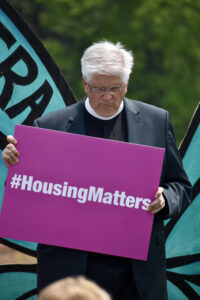
Peter Cook, executive director of the New York State Council of Churches, participates in a NETWORK “Care Not Cuts” rally NETWORK on Long Island on May 22.
The NETWORK partnership works, says Cook: “Roman Catholics are well grounded in Catholic Social Teaching, which has a lot of depth — theological depth — to it, and it’s very compatible with the position statements of our (nine) denominations. But I appreciate the depth of thought that goes into the social positions, and also particularly among religious …sisters.”
“We trust them, and they give a good social justice opinion on issues before Congress. They’ve already done their homework,” echoes William Hurley, a team member from Washingtonville, N.Y. “I know it’s in line with where I want to go as a Catholic.”
Members of the New York team met in February with the staff of their representative, Rep. Claudia Tenney (NY-24), a Republican who is not often aligned with NETWORK on justice issues.
“The staff expressed gratitude for the opportunity for conversation. Tenney puts out a weekly newsletter and puts out her record and an explanation on why she voted [as she did],” Kiefer says. “We commended her staff for that.”
Transforming Politics
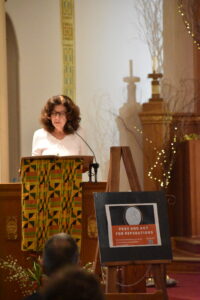
Jane Sutter Brandt speaks at an August 2022 reparations vigil in Rochester, N.Y., one of four reparations-themed events sponsored by NETWORK’s New York Advocates Team.
In addition to building relationships, whether in their communities or in engagement with elected officials who may or may not share their priorities, the New York Advocates team has a robust track record of taking action to raise awareness on key issues and spurring people to greater action.
Team member and organizational partner Serena Martin Liguori is the executive director of New Hour for Women and Children on Long Island, which advocates for marginalized women and mothers who have been arrested or incarcerated, or have had family who have been incarcerated. Martin Liguori helped to organize and participated in NETWORK’s Care Not Cuts rally on Long Island in May. The event, which drew over 85 attendees and 12 community organizations, opposed proposed cuts in the federal budget to essential human programs providing food, housing, and healthcare.
“It was wonderful to bring together the faith-based and the local community — justice-impacted folks, folks who really rely on the system,” says Martin Liguori.
Other New York NETWORK Advocates Team members planned and hosted a “repair and redress” reparations prayer vigil last year in Rochester. The event pressed for support for H.R. 40, a bill that would create a commission to study the lasting impacts of slavery and Jim Crow in the U.S. and the possibility of reparations for Black Americans. It was one of four reparations events held by members of the team in different parts of the state—one of which included Rep. Sheila Jackson Lee (D-TX), H.R. 40’s chief proponent.
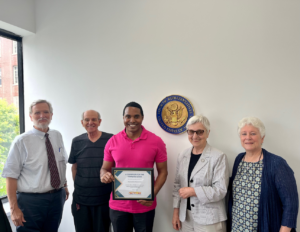
Jim Buckley and Joseph Molinatti join NETWORK Advocates Carol DeAngelo and Lois Harr in presenting a 2022 NETWORK Voting Record certificate to Rep. Ritchie Torres (N.Y.-15).
H.R.40 was first introduced in 1989 by former Rep. John Conyers (D-MI) and has been introduced in every Congress since. The bill has yet to come to a House vote, and during the 2020 campaign, President Biden promised to set up such a commission. NETWORK has urged him to do so by executive action.
Sr. Phyllis Tierney, an Advocate Team member and justice coordinator for her community, the Sisters of St. Joseph of Rochester, says reparations go well beyond slavery and require drawing connections for people to help them understand racist structures and policies through the years that have excluded Black communities from opportunity and deprived them of wealth. One example: the widespread destruction of Black neighborhoods across the country to build interstate highways.
“It really destroyed cities and neighborhoods. That was one of the things that we’ve talked about: to give examples, and local examples, that people would talk about and understand,” Sr. Phyllis says of the education, conversion, and the dismantling of systemic racism that must precede political transformation. “It really brought out the reason for doing this prayer vigil. …It was certainly good consciousness-raising.”







